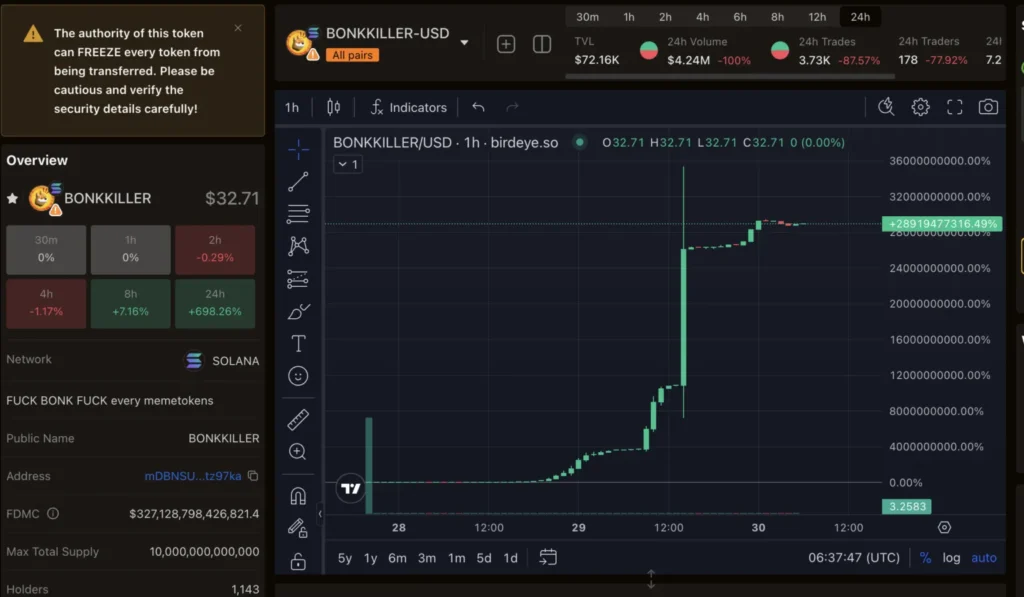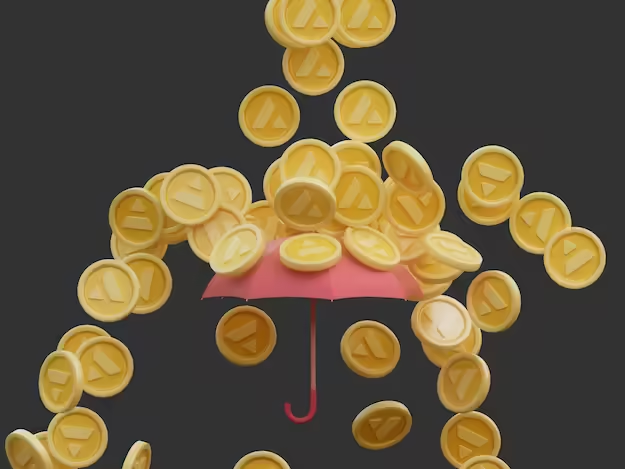The cryptocurrency world of solana memecoin, always a hotbed for speculation, hype, and the occasional scam, has been rocked by the recent saga. This article explores the intriguing and troubling journey of a memecoin on the Solana blockchain that astonishingly reached a $328 trillion market cap, only to be unmasked as a sophisticated honeypot scam, highlighting the volatile nature of the crypto market.
The Meteoric Rise of solana memecoin BONKKILLER

On April 29th, 2024, an obscure Solana-based memecoin named BONKKILLER made a dramatic entrance, capturing the attention of the crypto world. With a modest base of just over 1,000 holders, it managed to generate a trading volume of around $4.6 million within the first day of its launch. Astonishingly, BONKKILLER briefly claimed the title of the highest market cap asset globally, surpassing the global domestic gross product’s total of $100 trillion, a feat that left many in disbelief.
The Honeypot Trap

The token rose by 3.6 billion % and was traded at $32 dollars making its market cap to 327.129 trillion dollars. However, the warning was there about developers can freeze all tokens from being transferred, at their whim. This makes investment very risky as people can loose money after they purchase the token. At this point it was more than the whole economy of the world.
However, the initial excitement around BONKKILLER’s explosive growth quickly turned to dismay. Investors eager to capitalize on what seemed like a golden opportunity found themselves unable to withdraw or transfer their holdings due to a ‘freeze authority’ feature activated by the developer, effectively locking the tokens and blocking any attempts to sell.
Employing a tactic known as a ‘honeypot’ scam, this strategy entices investors with the promise of high returns but ultimately traps their funds. In BONKKILLER’s case, the touted $328 trillion market cap was a mirage, leaving the tokens utterly valueless to their holders and exposing the scam’s true nature.
The Aftermath and Ongoing Concerns
The exposure of BONKKILLER as a honeypot scam has sent ripples through the cryptocurrency community. Despite warnings from various platforms and industry experts about the memecoin’s dubious nature, many investors continued to invest, lured by the illusion of quick, massive gains.
The aftermath of the BONKKILLER scam saw its creator siphoning off $1.62 million from victims through 11 transactions, exacerbating the plight of those already caught in the scam’s web. This incident underscores the critical need for due diligence and enhanced security in the decentralized finance (DeFi) sector.
The Broader Implications
The BONKKILLER incident isn’t an anomaly. A Cointelegraph Magazine investigation revealed that a significant portion of memecoins on Ethereum’s layer-2 solution, Base, are scams or exhibit scam-like traits. Moreover, the study found that a staggering 91% of these memecoins had at least one security flaw, highlighting the risks lurking in the memecoin space.
These revelations highlight the increasing issue of scams within the memecoin ecosystem, turning it into fertile ground for fraudsters aiming to exploit the unwary. As the crypto industry evolves, there’s a pressing need for better regulatory oversight and more sophisticated tools to detect scams, ensuring the safety of investors.
The Role of Blockchain Technology in Scam Prevention
In the wake of the surge in honeypot scams and other cryptocurrency frauds, the blockchain community has rallied to develop solutions aimed at thwarting these threats. Utilizing advanced smart contract and token analysis, these tools offer real-time detection of potential scams, providing a crucial safeguard for investors navigating this volatile landscape.
Leveraging cutting-edge algorithms and a data-centric approach, scam prevention platforms are at the forefront of identifying and alerting users to suspicious activities. These innovations empower investors, helping them steer clear of the allure of investments that seem too good to be true and safeguarding their assets against the latest scams.
The Importance of Investor Education
While technological solutions are pivotal in mitigating the impact of cryptocurrency scams, individual investors bear the ultimate responsibility. It’s crucial to educate the public on the risks and warning signs of investing in memecoins and other speculative digital assets, fostering a more informed and discerning investor community.
Financial literacy programs, industry-led awareness campaigns, and collaborative efforts between regulators, exchanges, and the crypto community can all contribute to equipping investors with the knowledge and tools necessary to navigate the complex and ever-evolving landscape of digital assets.
Regulatory Challenges and the Need for Collaboration
The rapid growth and innovation within the crypto industry have posed significant challenges for regulators. Crafting effective policies and frameworks that balance fostering innovation with safeguarding investor interests is a complex and ongoing endeavor.
Addressing the rise of memecoin scams and other forms of cryptocurrency-related fraud requires a collaborative approach, involving policymakers, industry leaders, and technology providers. By working together to develop comprehensive regulatory guidelines, enhance security standards, and promote transparency, we can make the crypto ecosystem a more trustworthy and sustainable environment for all participants.
The Future of Memecoins and the Importance of Caution
The BONKKILLER incident serves as a cautionary tale for the entire crypto industry. While memecoins have captured the public’s imagination and attracted significant investment, the inherent risks associated with these speculative assets cannot be ignored.
As the memecoin landscape continues to evolve, investors must exercise extreme caution and prioritize thorough research and due diligence before committing their funds. The allure of potential quick profits should never overshadow the fundamental principles of responsible investment and the need to safeguard one’s financial well-being.
Conclusion: Lessons Learned and the Path Forward
The saga of the Solana memecoin, which reached a staggering $328 trillion market cap, has exposed the vulnerabilities and risks within the crypto ecosystem. This incident serves as a stark reminder of the importance of investor education, robust security measures, and the ongoing challenges regulators face in keeping pace with the rapidly evolving digital asset landscape.
As the industry continues to mature, it’s crucial for all stakeholders – from individual investors to policymakers and technology providers – to collaborate in fostering a more transparent, secure, and trustworthy cryptocurrency ecosystem. Only through a collective effort to address scams, vulnerabilities, and regulatory gaps can we realize the true potential of blockchain technology and safeguard the trust of the investing public.
FAQs
1)What is the story behind the rise and fall of the Solana-based memecoin, BONKKILLER?
The article explores how BONKKILLER reached a $328 trillion market cap, only to be revealed as a honeypot scam, highlighting the volatile nature of the crypto market.
2)How did BONKKILLER manage to capture the attention of the crypto world?
BONKKILLER made a dramatic entrance on April 29th, 2024, generating a trading volume of around $4.6 million within the first day and briefly claiming the title of the highest market cap asset globally.
3)What are the broader implications of the BONKKILLER scam?
The incident highlights the increasing issue of scams within the memecoin ecosystem and the need for better regulatory oversight and more sophisticated tools to detect scams, ensuring the safety of investors.
4)What measures are being taken to prevent scams like BONKKILLER in the future?
The blockchain community is developing solutions utilizing advanced smart contract and token analysis to offer real-time detection of potential scams, empowering investors and safeguarding their assets.
Table of Contents
Disclaimer: The information provided in this article is for informational purposes only and should not be considered as financial or investment advice. The cryptocurrency market, including crypto trading and crypto assets, is highly volatile, and readers are encouraged to conduct their own research and consult with a financial advisor before making any investment decisions in the crypto space. Hash Herald is not responsible for any losses in the market.













